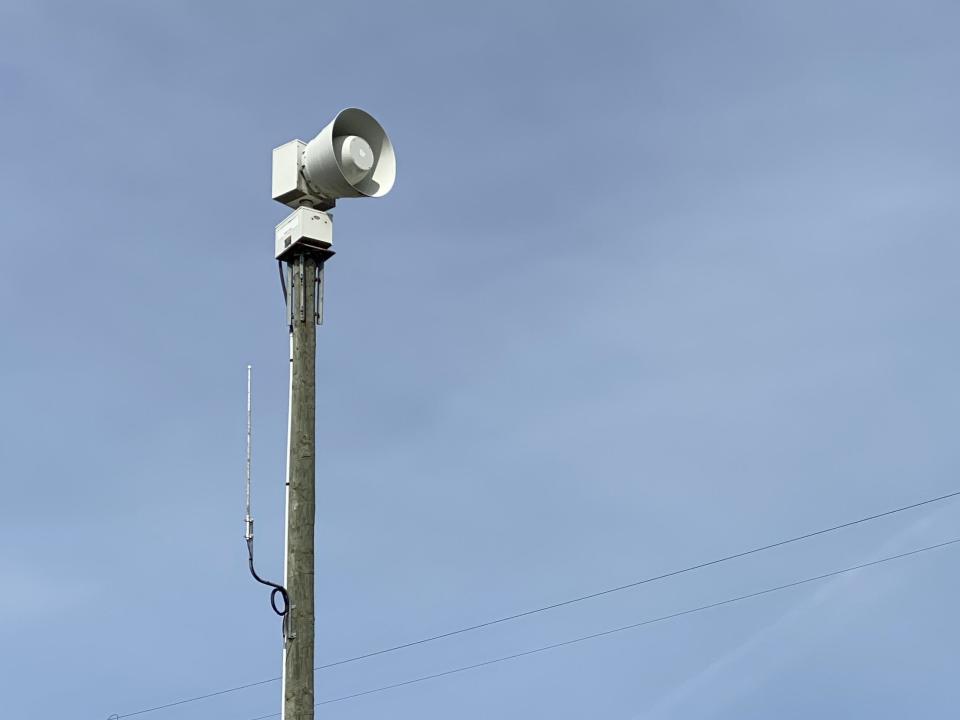Milwaukee County residents will hear tornado sirens twice on Thursday. Here's why
Update: The National Weather Service and its partners have canceled the 6:45 p.m. tornado drill due to possible severe weather threats in southwestern and south-central Wisconsin this afternoon.
Milwaukee County tornado sirens are scheduled to sound twice on Thursday, April 11 as part of a statewide tornado drill.
The drill is part of Wisconsin's Tornado and Severe Weather Awareness Week, which is organized by the state's National Weather Service offices, Wisconsin Emergency Management and other agencies. The week takes place annually, typically in early April ― often the beginning of Wisconsin's tornado and thunderstorm season, said local NWS meteorologist Marcia Cronce.
Residents are encouraged to discuss and practice their severe weather safety plans during the drills.
Here's what to know.
When is Milwaukee's Severe Weather Awareness Week tornado drill?
The statewide tornado drills will occur on Thursday, April 11 at 1:45 p.m. and 6:45 p.m. Tornado sirens will sound in Milwaukee County and many other municipalities.
Doing the drill twice allows residents to discuss and practice their tornado safety plans in multiple settings, Cronce explained.
"A lot of people work during the day, so, you could go over what you'd do at your workplace or at school," she said. "Then, in the evening, say you're home with your family during dinner ... you could discuss your plan and what you would do in the case of severe weather."
During both drills, NWS offices will conduct NOAA Weather Radio tests. Additionally, some local media outlets may participate by cutting into on-air programming or posting to social media. However, cell phone emergency alerts and alarms will not go off, Cronce said.
If there is an actual severe weather threat in Wisconsin on Thursday, the statewide drills will be postponed until the following day (Friday, April 12), according to Wisconsin Emergency Management.
Tornado safety tips
Wisconsin averages 23 tornadoes per year, WEM said. Last year, NWS confirmed 21 tornadoes in the state, including over a dozen in one day in southern Wisconsin on March 31.
Thursday's tornado drills offer residents the opportunity to practice what they'd do to stay safe during a real tornado. WEM recommends reviewing these severe weather safety tips:
Create an emergency plan and practice it.
Know where designated shelters are at home, work and school. Be ready to go there when a tornado warning is issued.
During the drills, practice where you'd go during a real tornado warning. Ideal tornado shelters include a basement, a ground-floor interior room, or a specially constructed safe room designed to withstand high winds and falling debris.
Have multiple ways to receive alerts about approaching severe weather. Outdoor warning sirens, NOAA Weather Radios, local media and mobile devices are all important tools. Don't rely on any single source for important life-saving information.
If you have a mobile device, ensure it can receive Wireless Emergency Alerts (WEA). On many devices, that option is available in the settings menu. Find out more about WEA at readywisconsin.wi.gov/be-informed/be-alert/.
Stay "weather aware" by checking the daily forecast for your area.
Create an emergency kit for your home. Find tips for making a kit at readywisconsin.wi.gov.

April 8-12 is Severe Weather Awareness Week in Wisconsin
NWS and other agencies will mark Severe Weather Awareness Week all week long with social media posts focusing on a different severe weather preparedness topic each day, Cronce said.
Monday will focus on impact-based warnings, including thunderstorm, tornado and flash flood warning levels. Tuesday focuses on thunderstorm preparation and dangers. Wednesday addresses flooding and flood watches and warnings. Thursday highlights tornadoes ― their effects, levels of severity and how to stay safe, and Friday focuses on hail.
Visit the Milwaukee NWS website to learn more about the week and how to prepare for these and other severe weather events.
More: What was the deadliest tornado to hit Wisconsin? Here are the biggest twisters since 1950.
More: When severe weather hits, these best practices will help you survive a tornado strike
This article originally appeared on Milwaukee Journal Sentinel: Milwaukee County tornado drills Thursday part of 2024 NWS programming

